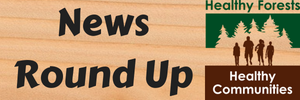Healthy Forests, Healthy Communities is pleased to announce that it has joined the Wisconsin Young Forest Partnership (WYFP), and Steve Kariainen, HFHC’s Great Lakes Region Director will serve on WYFP’s steering committee.
The WYFP was organized in December 2013 to more broadly promote young forest habitat conservation and enhance this resource across the state. For several years prior to this, public and private resource professionals in Wisconsin had noted the impact of declining early successional habitat on many game and non-game wildlife species and were searching for ways to effectively call attention to the loss of this critical habitat and to promote and deliver resources to assist landowners with management.
Like much of the Eastern United States, young forests in Wisconsin have been in a decline for the last half century. Young forest habitat is made up of quick growing, sun loving trees and shrubs like aspen, tag alder, paper birch, and jack pine. Since these species require sunlight to grow, they need a disturbance like a windstorm, wildfire, or a tornado to occur. Many natural disturbances are suppressed by humans though.
WYFP aims to enhance young forest habitat across Wisconsin to benefit declining wildlife populations, such as the American Woodcock and Golden-Winged Warbler. One organization would not be able to adequately make an impact, but by joining the efforts and resources of 16 federal and state agencies, wildlife and forestry organizations, non-profits, and timber companies, the WYFP is able to create a landscape-scale conservation approach through public and private lands.
Private landowners own over 50% of the land in Wisconsin, so are considered an important part to achieve landscape-scale conservation. The Partnership performs outreach to private landowners to educate them about the importance of management, such as timber harvests, to benefit wildlife on their properties. WYFP combines the resources from its 16 partners to provide private landowners with technical and financial assistance to get habitat management done on their properties.
WYFP also hosts workshops for landowners, trainings for natural resource professionals, conducts education presentations to school groups or clubs, advocates for young forest in policy, conducts research to ensure management efforts are providing anticipated benefits, and creates young forest demonstration areas on public land to showcase what young forest management looks like.



